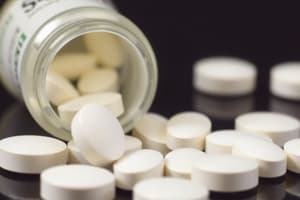Podcast
Questions and Answers
What is Chlorpromazine primarily used to treat?
What is Chlorpromazine primarily used to treat?
- Schizophrenia (correct)
- Anxiety Disorders
- Bipolar Disorder
- OCD
What severe side effect is associated with Clozapine?
What severe side effect is associated with Clozapine?
- Tardive dyskinesia
- Dry mouth
- Agranulocytosis (correct)
- Weight gain
Which medication is classified as a mood stabilizer?
Which medication is classified as a mood stabilizer?
- Clozapine
- Aripiprazole
- Haloperidol
- Lithium Carbonate (correct)
What class of medications does Haloperidol belong to?
What class of medications does Haloperidol belong to?
What is a common side effect of Lithium Carbonate?
What is a common side effect of Lithium Carbonate?
Which of the following medications is indicated for both positive and negative symptoms of schizophrenia?
Which of the following medications is indicated for both positive and negative symptoms of schizophrenia?
What is a potential side effect associated with Aripiprazole?
What is a potential side effect associated with Aripiprazole?
What is a risk associated with high doses of Haloperidol?
What is a risk associated with high doses of Haloperidol?
What potential side effect is associated with the use of Amitriptyline?
What potential side effect is associated with the use of Amitriptyline?
What is a key characteristic of Buspirone compared to other anxiolytics?
What is a key characteristic of Buspirone compared to other anxiolytics?
Which medication should not be used in conjunction with other antidepressants?
Which medication should not be used in conjunction with other antidepressants?
What is a common side effect of Escitalopram?
What is a common side effect of Escitalopram?
What is a major risk of mixing Phenelzine with tyramine-rich foods?
What is a major risk of mixing Phenelzine with tyramine-rich foods?
For which condition is Donepezil primarily prescribed?
For which condition is Donepezil primarily prescribed?
What effect does Methadone have when used for long-term maintenance in opioid use disorder?
What effect does Methadone have when used for long-term maintenance in opioid use disorder?
Which statement is true regarding Naloxone?
Which statement is true regarding Naloxone?
Flashcards
Chlorpromazine use
Chlorpromazine use
Typical antipsychotic medication used for Schizophrenia.
Haloperidol use
Haloperidol use
Treats Schizoaffective disorder, Bipolar with Mania, and Psychosis. Important to note Extrapyramidal symptoms.
Atypical antipsychotic example
Atypical antipsychotic example
Aripiprazole, a 2nd-generation antipsychotic, used to treat Schizophrenia and associated conditions. Watch out for metabolic side effects
Risperidone side effects
Risperidone side effects
Signup and view all the flashcards
Clozapine side effects
Clozapine side effects
Signup and view all the flashcards
Lithium Carbonate use
Lithium Carbonate use
Signup and view all the flashcards
Lithium carbonate toxicity
Lithium carbonate toxicity
Signup and view all the flashcards
Lithium side effects
Lithium side effects
Signup and view all the flashcards
Diazepam's effect on vital signs
Diazepam's effect on vital signs
Signup and view all the flashcards
Buspirone's benefit
Buspirone's benefit
Signup and view all the flashcards
Amitriptyline side effects
Amitriptyline side effects
Signup and view all the flashcards
SSRI risk
SSRI risk
Signup and view all the flashcards
MAOI interactions
MAOI interactions
Signup and view all the flashcards
Donepezil use in Alzheimer's
Donepezil use in Alzheimer's
Signup and view all the flashcards
Methadone use and dangers
Methadone use and dangers
Signup and view all the flashcards
Naloxone use
Naloxone use
Signup and view all the flashcards
Study Notes
Medications - Unit 2
-
Chlorpromazine/Haloperidol (Typical/1st generation Antipsychotic): Used for schizophrenia, schizoaffective disorder, bipolar with mania and psychosis. Side effects include anticholinergic symptoms (dry mouth, constipation, blurred vision), extrapyramidal symptoms (Parkinson's-like symptoms), and orthostatic hypotension.
-
Aripiprazole/Risperidone/Clozapine (Atypical/2nd generation Antipsychotic): Used for schizophrenia, schizoaffective disorder, bipolar with mania and psychosis, and OCD. Clozapine can have a side effect of agranulocytosis. Atypical antipsychotics generally have fewer extrapyramidal side effects than typical antipsychotics.
-
Lithium Carbonate (Mood Stabilizer): Used for schizophrenia and bipolar disorder. Common side effects include hand tremors, increased thirst and urination, weight gain, dizziness, and fatigue. Toxicity can lead to slurred speech, muscle weakness, nausea, vomiting, and confusion. Harmful in pregnancy and breastfeeding.
-
Diazepam/Lorazepam (Benzodiazepine, Major tranquilizer): Used for anxiety and alcohol withdrawal. Side effects include sedation, decreased respiratory rate and heart rate, and addictive potential.
-
Buspirone (Anxiolytic, Minor tranquilizer): Used for anxiety. Non-sedating and non-addictive, taking 2-4 weeks to show effect.
-
Amitriptyline (Tricyclic antidepressant): Used for major depressive disorder, insomnia, and chronic pain. Side effects include orthostatic hypotension, sedation, anticholinergic symptoms, and suicide risk.
-
Escitalopram/Fluoxetine (Selective serotonin reuptake inhibitors, SSRIs): Used for major depressive disorder. Side effects include weight gain, insomnia, sexual dysfunction, and serotonin syndrome risk.
-
Phenelzine (Monoamine oxidase inhibitors, MAOIs): Used for major depressive disorder and panic disorder. Avoid combining with other antidepressants and tyramine-rich foods (such as aged cheese, cured meats, and wine) to prevent hypertensive crisis.
Medications - Unit 2 (continued) - Page 2
-
Donepezil (Anti-Alzheimer's Full Agonist opioid): Used for early to mid-stage Alzheimer's disease. Administration is best given at bedtime; sedating and can cause constipation.
-
Methadone (Full Agonist opioid): Used for opioid use disorder long-term maintenance and chronic pain. Significant side effects include vivid dreams, sedation, and constipation.
-
Naloxone (Opioid antagonist): Used for opioid overdose. Low risk of harm, and generally safe to administer.
-
Buprenorphine (Opioid partial agonist antagonist): Used for opioid use disorder. Can cause constipation, sedation, dizziness, headache, and muscle cramps, but less of an overdose risk than pure opioid agonists. Potential for polysubstance abuse.
Studying That Suits You
Use AI to generate personalized quizzes and flashcards to suit your learning preferences.




